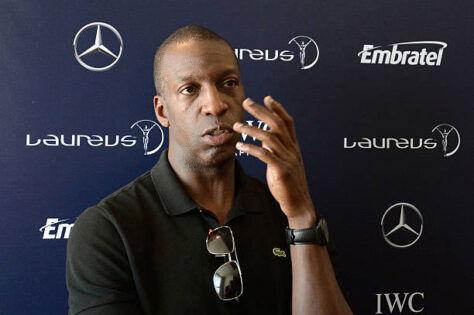Imagine this: It’s 2025, and you’re one of the fastest runners in the world, a total star in the 400m. But instead of living the high life, you’re working a brutal overnight shift at UPS to get by. That’s the reality for Jacory Patterson, a 25-year-old speedster from South Carolina. FloTrack shared his crazy schedule—up early to train, lift, maybe get treatment, then crash for a few hours before starting work at 8 p.m., finishing up at 4:30 a.m. before doing it all over again. Doesn’t exactly sound like the life of a top athlete, right?
When FloTrack posted about Patterson, initially saying he was “unsponsored,” fans went wild. The feeling online was strong—surely getting a sponsor would fix everything for him, like the big deals you see in other sports. But maybe that’s not the whole story? That’s when Michael Johnson, the absolute legend of the track world, jumped in. He quoted FloTrack’s post on X and dropped a truth bomb.
“People keep saying, Sponsor him,” Johnson wrote. “Newsflash: He is sponsored! That’s the problem. For some athletes, relying totally on a sponsor isn’t enough. You need to earn real money competing. Sponsorship should be only part of it.” Johnson’s words hit hard, challenging the idea that a sponsor magically fixes everything. But why does Johnson, someone who had massive success, see it this way?
People keep saying “Sponsor him”. Newsflash: He is sponsored! That’s the problem. For some athletes relying totally on a sponsor isn’t enough. You need to earn real money competing. Sponsorship should be only part of it. https://t.co/Q7Tw1GHuy3
— Michael Johnson (@MJGold) May 4, 2025
Johnson is highlighting a tough reality: sponsors help, sure, but they rarely solve the money problems track and field athletes face. Patterson does have a sponsor, as Johnson pointed out, but it’s not enough to stop him from earning real money competing. The truth is clear—athletes like him need more than just a brand logo to really make a living. Johnson’s point makes sense when you look at the bigger picture in the sport.
Sometimes, athletes even have to pay for their travel to big events like the Diamond League because there are no appearance fees. And if they don’t win medals at major championships like the Olympics, those sponsor deals can just disappear, leaving them struggling financially. So, what does this mean for talented athletes like Patterson down the road? It’s hard not to feel for Patterson—a young star who should be focused purely on running, not juggling a draining work schedule.
Michael Johnson’s passionate tweet has sparked a conversation, forcing us to look hard at how athletes are supported in track and field. Sponsors are a piece of it, but as Johnson argues, they’re not the full answer. The whole system needs fixing so that amazing talents like Patterson can chase their running dreams without having to sacrifice their livelihood. So, what’s the next step for the sport to truly support its athletes? That’s a question everyone involved—the fans, the athletes, and the people running the sport—needs to figure out together.
Michael Johnson’s Long-Standing Mission to Fix Athletes’ Financial Struggles
Michael Johnson wasn’t just suddenly talking about athletes needing more money because of Jacory Patterson; he’d been vocal about it for a long time. It was this deep-seated concern that led him to start Grand Slam Track (GST). Back in a November 2024 article, Johnson painted a tough picture of what the sport is like for many, saying stuff like, “We have athletes… who literally are taking on jobs at Walmart and suffering financially.”
Then they look at athletes in other sports signing massive deals, like five years for $100 million, and they think, ‘Why not me?’” He also pointed out that fans lose out too, saying, “These are the best in the world, yet they are suffering financially. Meanwhile, fans who want to watch more track and field outside the Olympics often can’t find it.” You could feel his frustration; he saw a system that wasn’t working for the athletes or the people who wanted to watch them.
So, Johnson decided to do something about it. He launched GST, setting up events in cities like Miami, Philadelphia, and Los Angeles in 2025. His main goal was to create a place where athletes’ financial well-being came first. He explained his idea by saying, “Athletes want to compete against each other more often, but there has to be an upside for them. We’ve created that upside — fair compensation, visibility, and brand-building opportunities.”
Johnson also stressed that they wanted to do new, modern things with the league but still respect the sport’s history and culture. With GST giving the winner of each “slam” $100,000 based on how they score over two races in a weekend, Johnson’s project shows what he meant when he said, “When you have a situation where the athletes are suffering and the fans are suffering — and you can fix it — you should fix it.”
So what do you think? Will Johnson be the savior that track and field needs? Or will he be another what-if?
The post Michael Johnson Drops Angry Rant as Grand Slam Track Commissioner Exposes Sponsorship Demands for Struggling Star appeared first on EssentiallySports.



